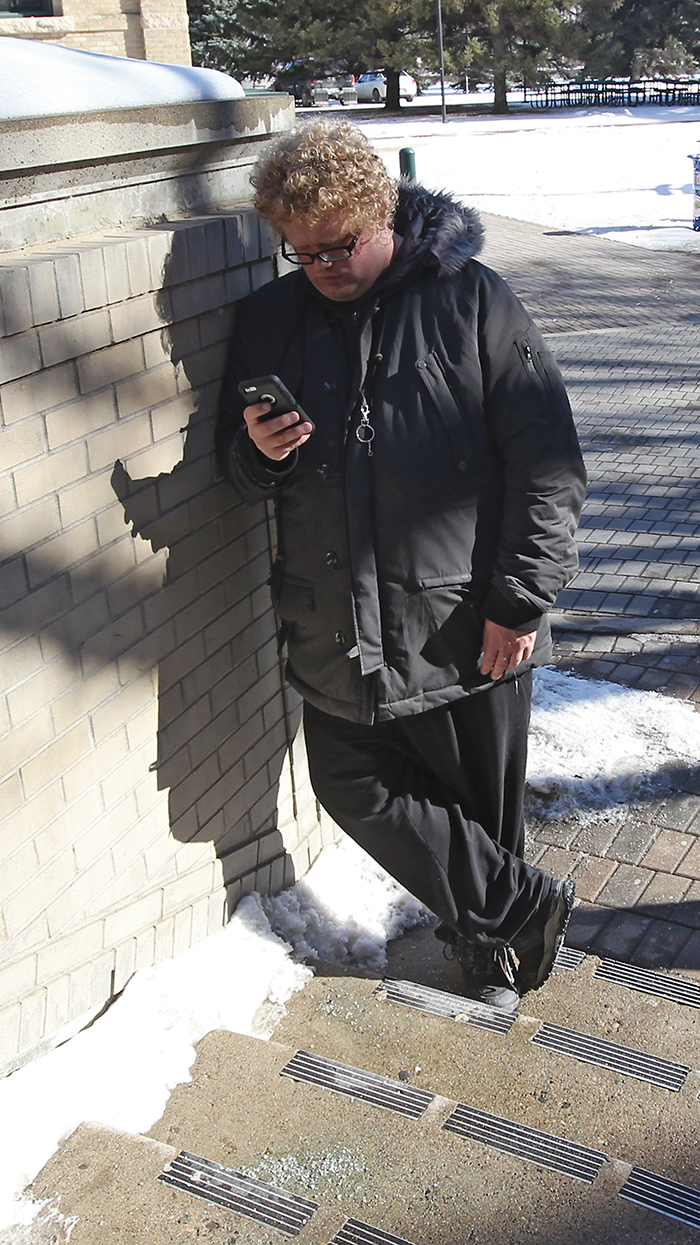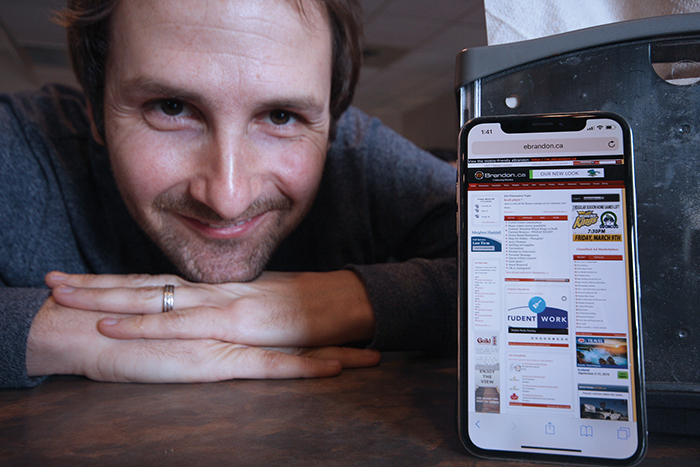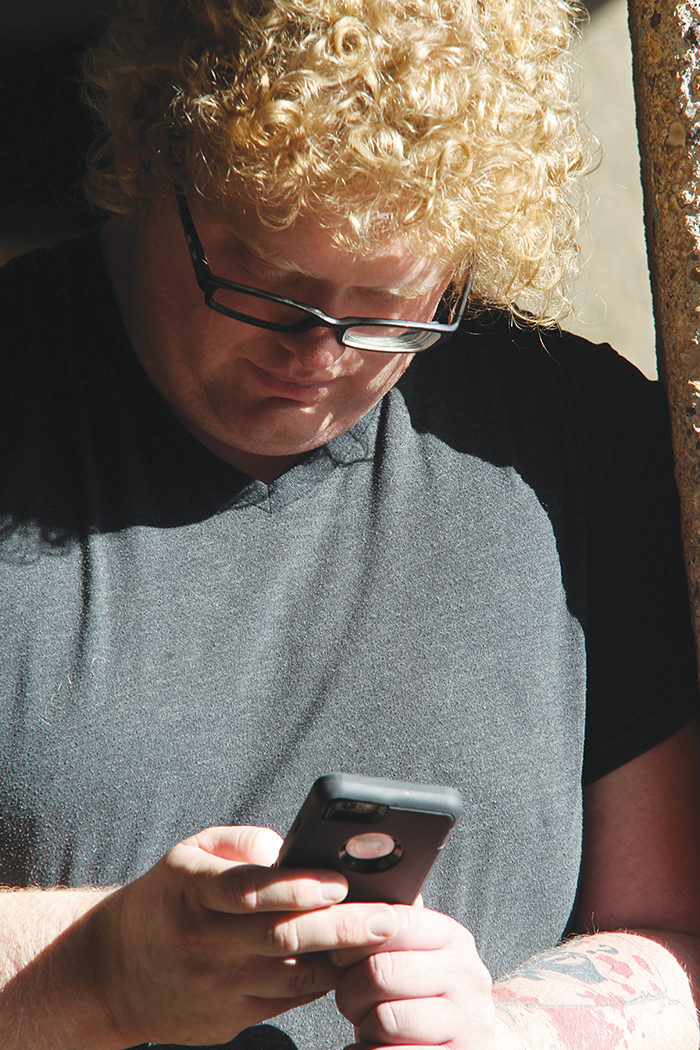Digital Detox
Advertisement
Read this article for free:
or
Already have an account? Log in here »
We need your support!
Local journalism needs your support!
As we navigate through unprecedented times, our journalists are working harder than ever to bring you the latest local updates to keep you safe and informed.
Now, more than ever, we need your support.
Starting at $15.99 plus taxes every four weeks you can access your Brandon Sun online and full access to all content as it appears on our website.
Subscribe Nowor call circulation directly at (204) 727-0527.
Your pledge helps to ensure we provide the news that matters most to your community!
To continue reading, please subscribe:
Add Brandon Sun access to your Free Press subscription for only an additional
$1 for the first 4 weeks*
*Your next subscription payment will increase by $1.00 and you will be charged $20.00 plus GST for four weeks. After four weeks, your payment will increase to $24.00 plus GST every four weeks.
Read unlimited articles for free today:
or
Already have an account? Log in here »
Hey there, time traveller!
This article was published 29/03/2018 (2881 days ago), so information in it may no longer be current.
Story by Erin DeBooy Photos by Matt Goerzen For the past three years from May until August, Nathan MacKrith has been taking a break from social media and his devices in order to reconnect with life off-screen.
“Summer is a beautiful time, and as Canadians we only have so long to enjoy the beautiful weather,” MacKrith said with a laugh. “I want to be out and about doing things, enjoying the weather rather than sitting inside — or even outside — on my phone … it’s just too much of a waste I find, to spend the whole summer on a phone when you could be spending time with actual people, doing all sorts of fun stuff.” MacKrith is one of many social media consumers reconsidering their relationship with the online platforms — as well as the device they use to access them.
Digital detoxing — taking a break from electronic devices and the online world in order to regain a balance in the real one — is becoming an increasing trend across North America.

A quick Google search, ironically enough, will produce a mix of day-to-day advice on how to effectively detox from technology, as well as tech-free or “off the grid” camps and retreats available around the world for those wanting to embark on a digital detox vacation.
Even entertainers are feeling the lack of personal connection to their audiences due to the overabundance of technology. Jack White, for example, recently announced his upcoming United States tour will be a phone-free experience —requiring the audience to lock their phone away in secured areas of the venue before going into the concert.
“We think you’ll enjoy looking up from your gadgets for a little while and experience music and our shared love of it in person,” White’s team said in a statement.
Alicia Keys, The Lumineers, and comedians like Chris Rock and Dave Chapelle have also made the same request of their audiences at recent events.
In a discussion thread on the local website eBrandon, initiated by The Brandon Sun’s managing editor Matt Goerzen, some Brandonites expressed frustration with how technology has infiltrated our world.
“I’ve given up technology. I have no social media, I have no cable, Netflix, anything of the sort,” one commenter wrote. “When you enter my house, there is a basket for phones. No joke. I don’t need to sit watching someone be in another world.”
“What I can’t stand is when I visit people or they come to stay at my place and they spend their time on their smartphone … we have become the most socially unsocial people,” another commenter added.
Others said they didn’t know if an all-out digital detox was necessary, but that they had taken steps to find a more positive balance with technology.
“For myself it has always been a situation of learning a bit of discipline … if your phone rings or if your phone dings, it is not a problem to ignore it because you know the message will still be there later,” one commenter said.
Adam Sobkow, eBrandon owner and manager, said he too has had to find a balance.
“On the whole, technology is a great thing and is a big part of my life,” Sobkow said. “Like anything where you have a smorgasbord of options to pick from and the ability to only consume so much, you have to learn to prioritize and strike a balance.”
Personally, Sobkow said he finds that balance lies in carefully choosing what notifications he has set up on his phone.
“I’ve found it important to be very choosey about what has the power to take my attention. It initially seems like a great idea to say yes to anything that wants to send you an alert that’s relevant to your life or interests in some way, but eventually those alerts start adding up,” Sobkow said. “Every time the phone buzzes and I check it, I’m getting pulled away from the present moment in some way… That doesn’t mean that all notifications are bad. Not long ago, the city starting offering the ability to send out emergency notifications. If there’s a critical situation in this city, I want that alert.”
As for eBrandon, Sobkow said he hasn’t gotten into sending phone notifications from the website, and he hasn’t necessarily had to. It is important, he said, that tech companies are mindful of the social responsibilities that come with the services they offer.
“Every service provider is going to be different … if you look at Facebook, for example, I imaine it’s a fine line between offering a service that their user base looks for and perhaps having ways of using that service which can lead to a form of unhealthy attachment for some,” Sobkow said. “I see (Facebook) has been tweaking the types of content their users see in newsfeeds toencourage usage they believe is healthy, which is something I respect in an environment where there is always going to be shareholder pressure to ramp up profits.”
Although disconnecting from the online world for months at a time may seem impossible, MacKrith said it’s actually not that bad.
“I don’t really find I miss the social media, maybe just a few people,” MacKrith said, adding he still allows himself to check his email once a day to keep in touch with some friends. “I sometimes miss seeing some of my friend’s feeds, but I keep myself busy with other stuff … I spend a lot of my time reading books instead of engaging in social media. I still allow myself to watch movies, as well.”
MacKrith also notices a reduction of stress after being off his phone for a bit, he said, and an increase in his ability to concentrate.
“I find it much easier to focus on my reading … it’s a little more of a struggle to read textbooks — or even non-textbooks — during the school year. I find it significantly easier to focus during those summer months,” MacKrith said.
While he recognizes some people may not be able to drop their devices cold turkey for months at a time, MacKrith said he recommends people allow themselves to disconnect — even if it’s only a few hours or a day at a time.

“I’m not saying we should get rid of social media, but give yourself some breathing room and engage with the real world,” MacKrith said. “It’s something I think we should all do a little more.”
Giving the brain a break from the constant demand of our devices is becoming more important to our mental health, says Dr. Teresa Sztaba, clinical psychologist and executive director of the Manitoba Psychological Society.
“We are so connected all of the time — we don’t have those natural rest periods that used to be built into our schedule prior to having constant access and demands from technology and various media,” Sztaba said. “I do think there has been an impact on people becoming more easily distracted. I think there also has been an increase in stress.”
For generations, people would have Sunday scheduled as a day to rest and spend time with family, Sztaba said, which was not only necessary for maintaining valuable relationships, but also to give our brains a much-needed break.
“Whether they were religious or not, people had an idea that there needed to be time set aside where commerce was not being done, where work was not being done, and people could visit and connect with each other … that was set into our schedules for a long time,” Sztaba said.
“It’s certainly very important for people to have down time. It’s very important for people to have times when their adrenaline levels are lower because they’re not feeling stressed about having to respond to multiple demands at the same time.”
Social media and similar technology has also impacted that social interaction, Sztaba said.
“I don’t think we’re connecting like we used to … even in normal, every day social interactions we are constantly being distracted from that caring and connecting relationship with others,” Sztaba said. “We have all kinds of social media that are for connecting with others, but it’s a different nature of a relationship, it’s often a more superficial kind of relationship.
There aren’t a lot of lengthy talks, for example, or deep connections with people.”
Some studies have even started to show negative effects due to the over-use of social media, said Chris Bromley, a psychiatric nurse working in child and adolescent mental health for Prairie Mountain Health.
“One study showed that youth who use social media almost constantly reported higher levels of loneliness and depression as compared to youth who had minimal use,” Bromley said. “Generally speaking, it feels like social media connects us, but the studies are showing higher levels of loneliness in those who focus on social media more than face-to-face interaction… chasing likes is not equivalent to making friends.”
Although there is no formal clinical diagnosis for an addiction to social media or, by extension, smartphones, the mediums share characteristics with other activities people can get addicted to, such as gambling, said Michael Ellery, a clinical psychologist with an expertise in addictive behaviours.
“It’s immediately reinforcing and somewhat randomly so … for instance, when you put a post up on Facebook, you get responses — likes, comments, that sort of thing — but you don’t necessarily know when it’s coming, how many you’ll get or how often,” Ellery said. “When you give people that kind of reinforcement schedule, that random reinforcement, it takes a long time for behaviours to extinguish.”
“Teenagers, Ellery adds, are especially susceptible to internet overuse.
Teenage brains are sort of wired to pursue novelty… they’re prone to lots of dopamine-firing in response to novel sorts of stimuli like social media use,” Ellery said. “Their brains are actually geared to be addicted to things.”
There are some benefits to technology as it is today, both Ellery and Sztaba said, and there is still a lot of research to be done on how it affects us.
“I do think there are advantages … I think the ability to have knowledge at your finger tips, basically the world encyclopedia of knowledge, is amazing. The ability to connect with people from all over the world is amazing,” Szaba said.
“There’s been contradictory findings about the effects of technology. Some findings seem to indicate that IQ levels are rising and there’s been a hypothesis that it might be associated with technology and that availability of information. However, some studies seem to indicate that too much use of technology might be associated with lower IQs … I think the jury is still out in that respect.”
“People are really interest in vilifying social media, but we haven’t made any clearly causal connections between people’s well-being and this sort of behaviour,” Ellery said.
Meditation, deep breathing and taking time to be calm, however, is never a bad idea, Sztaba said, as a way to regain balance and give the brain some time to recharge.

“Even if you can stop and breath calmly in a relaxed way for a couple of minutes, it can be of benefit,” Sztaba said.
Looking to Disconnect?
Here are some tips on doing a digital detox of your own
Plan your day
Make it a gradual change. Start by putting the phone away for 15 minutes at a time in your schedule you would usually pick it up. The next day, put it down for 30 minutes, and so on. Give yourself a time limit for how long you can be on your phone, too. Or designate one day a week to stay away from social media and your devices entirely — No Facebook Fridays or Twitter-Free Tuesdays.
Disable pushes and notifications
Turn off your phone’s push notifications — especially for social media apps — to cut back on your digital dependency. Notifictions are a cue for your brain to engage that application, “to just pick it up and mindlessly engage,” clinical psychologist Michael Ellery said.
Exercise in airplane mode
Listening to a playlist while on a run or lifting at the gym is pretty inevitable, but while music can boost your effort, stopping mid-workout to answer a text takes away from burning calories. Turn your phone to airplane mode or do not disturb to focus fully on your workout.
Make it a group thing
It can be helpful to plan a digital detox with people around you, like family members or coworkers. Tell people what you’re doing, plan group activitiesmake it a challenge! This can hold you accountable, allow you to reconnect face-to-face and practice the relationship skills that can’t be replicated over technology.
Keep technology out of the bedroom
Get an old-fashioned alarm clock and leave the phone charging in another room. “If you’re looking for the easiest change to your technology use that will have a positive benefit – stop looking at your phone one hour before bedtime. Plug it in outside of your room and go to bed,” says PMH psychiatric nurse Chris Bromley.
Beat the FOMO
Anxiety of what you’re passing up — known as FOMO (Fear Of Missing Out) — can be a struggle, but tell yourself it’s okay to be where you are, present in the moment. Social media only shows the highlights of other people’s lives, so while it may feel like you’re missing out on something awesome, chances are things aren’t as exciting behind the screen.
